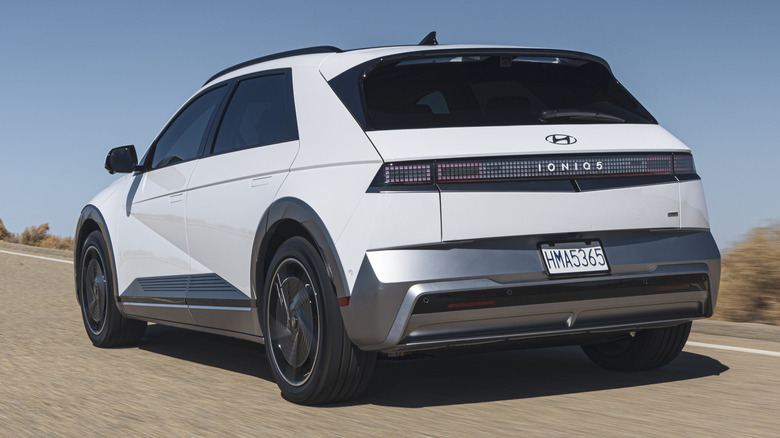Hyundai took a huge risk on the Ioniq 5’s styling, but it’s also been a huge hit, at least as far as electric vehicles go. While year-to-date sales were up 14% through the first four months of 2025, sales may have actually been even higher if it had been eligible for the $7,500 federal tax credit. You could still get the credit on leases, but if you wanted to actually buy your Ioniq 5, you were out of luck. The good news is, that’s now changed with the latest update from the Environmental Protection Agency, InsideEVs reports.
The EPA released an updated list of vehicles that are officially eligible for the federal tax credit on May 1, and the Hyundai Ioniq 5 is back on the list. We expected that as the 2025 model year facelift is now built at Hyundai’s new mega-factory near Savannah, Georgia, a location that is firmly within the United States. That switch happened last year, but it wasn’t until fairly recently that its battery supplier, SK On, began assembling the Ioniq 5’s batteries in its Georgia factory as well, which made the car eligible for the full credit again. And while it likely won’t be completely immune from tariff-related price increases, having both the car and the battery built here should help insulate the Ioniq 5 from the worst of Trump’s tariffs.
Sadly, while it’s great for potential buyers that the Ioniq 5 XRT now has an effective price below $50,000, the far cooler, 600-hp Ioniq 5 N is still built in Korea, so it isn’t actually eligible for the tax credit. Theoretically, Hyundai could move Ioniq 5 N production to the U.S. relatively easily since it already builds the regular version here, but at least for now, that’s not the case.
Get the federal tax credit while you can
If you want to take advantage of the federal tax credit, you need to choose an EV with an MSRP below $80,000 and make less than $150,000 per year if you’re an individual, $225,000 if you file as head of household or $300,000 if you and your spouse file jointly. You also likely need to act fast, because Congressional Republicans have had it out for the federal EV tax credit for a while and now look ready to finally kill it.
In addition to recently proposing a federal EV tax, they’ve also introduced legislation to get rid of EV incentives altogether. Opponents of the incentives have long argued the free market should get to decide whether EVs succeed or not, which has always been hypocritical coming from a party that loves to subsidize the things it likes, such as oil and corn. It also ignores the part where the federal government has a vested interest in keeping the air clean for people to breathe, and reducing transportation pollution is a big part of that. Money spent reducing pollution also saves money spent dealing with the consequences of that pollution down the line.
Then again, Republicans talk a big game about saving money, but they don’t have a great track record of actually reducing deficits. Even Tesla CEO Elon Musk’s so-called Department of Government Efficiency hasn’t actually saved the federal government any significant money, Bloomberg reports. In fact, Musk’s attempts to gut the federal government are now projected to increase the deficit by more than $2 trillion by the end of the year. Oops. But hey, at least they’ll make sure our air isn’t as clean. No one really needs clean air, right?




